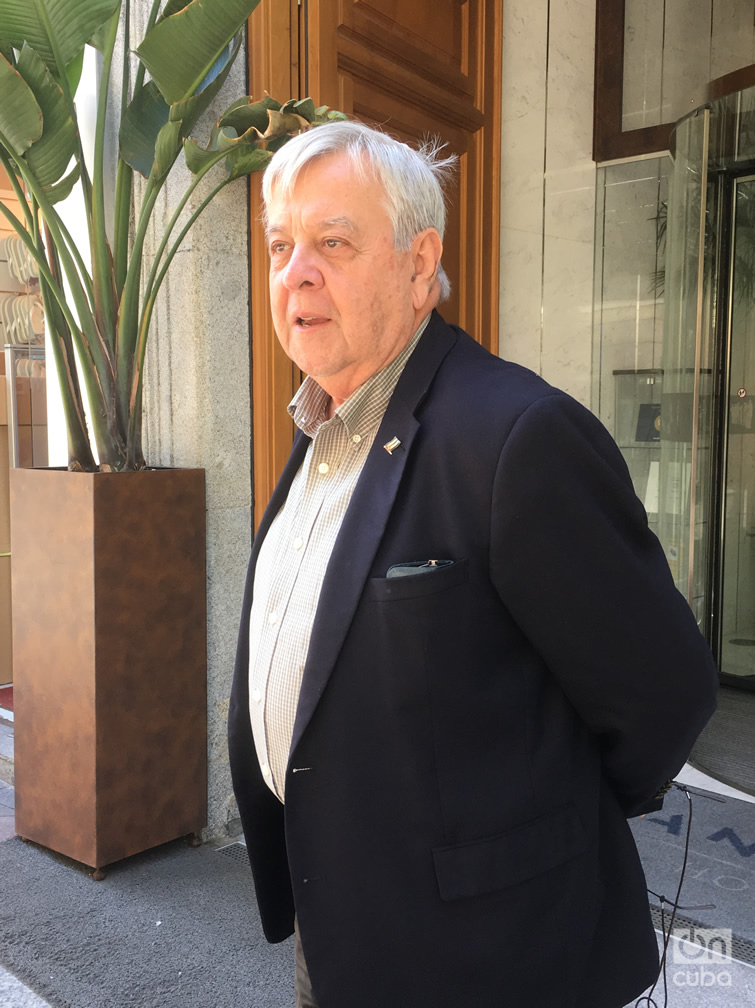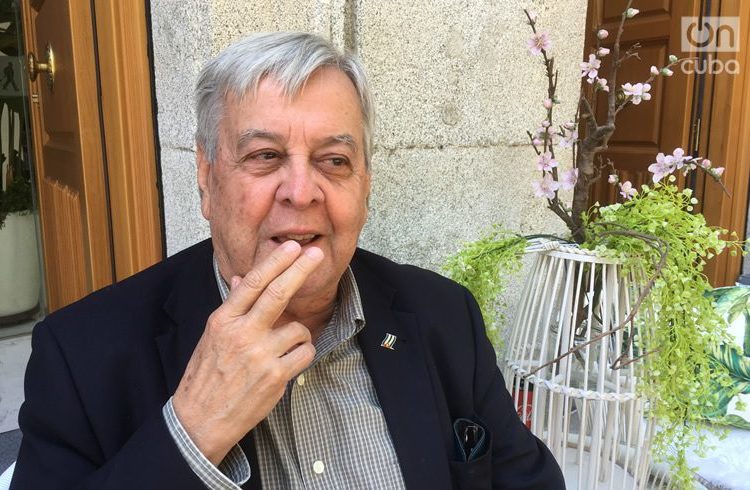We met at a café close to the Puerta del Sol where around these days it’s easy to recognize the Cubans who have come to Madrid, in passing, before getting to Barcelona. It is special to meet here and not in Havana, where I have been able to talk many times – also drinking a cup of coffee – with Carlos Alzugaray, former Cuban diplomat, academician, independent political analyst, and an OnCuba collaborator.
Alzugaray is getting ready to participate next May 23-26 in the 36th International Congress of the Latin American Studies Association (LASA).
It is the first time this event is held in Europe. “Two years ago it was decided to diversify and expand LASA because its annual congresses were not only focused on the Americas because LASA has enormously expanded with members from all over the world,” he explains.
In fact, this year’s theme is “Latin American Studies in a Globalized World.”
“When the Congress was held in New York two years ago, LASA had around 12,000 members and now it has 17,000,” adds Alzugaray, who for some years was elected by its members to co-chair LASA’s Cuba Section, in the “half” that corresponds to the residents on the island.
The venue of these events, increasingly well-attended, will rotate between the United States, Latin America and Europe: the next ones will be held in Boston in 2019 and in Guadalajara in 2020.
LASA’s Cuba Section, which includes Cuban residents in Cuba and outside Cuba – not just in the United States – has 1,200 members and is the biggest section of the Association. This is due to a great extent to the facilities LASA has given for the participation of Cubans resident on the island, exempting them from paying the member fees and for the accreditation in the congresses.
“In relation to this subject a new problem has come up since this year the Cubans residents on the island have been forbidden to vote in the elections for the executive posts of all of LASA. It was argued that that was due to the economic sanctions that we in Cuba call blockade. It was a surprise because we had been regularly voting in the elections.”
Why does a vote by a resident in Cuba contravene the blockade laws?
We were told that that prohibition to vote should have been applied since 2005 or 2006 and that at that moment the executive board at the time had been informed that the exemption of payment was compensation for that measure that I would say is discriminatory. The LASA executives explained that the measure had not become effective until this year for technical reasons and they asked us for understanding. But there’s an element that complicates the situation: no executive of the Cuba Section from that period remembers that understanding having existed. Some even affirm that they would never have accepted it.
It seems the LASA executives have wanted to prevent an interpretation of the case based on those regulations that derive in a sanction and that could result in enormous fines that LASA could not pay. There are also practical questions like the need to use debit or credit cards for this type of payments, which in the case of the Cubans resident in the country we wouldn’t have the opportunity to do.
Out of the total members of LASA’s Cuba Section, how many live in the country and how many abroad?
A bit over half of us live on the island. Since the Cuba Section is so big Cuba’s absence in a congress would be very noticeable. That is the danger that is being run for Boston 2019. In times of Bush, when the strictest measures were applied and practically all the academic applicants were denied visas – I’m referring to the Las Vegas Congress -, the following year LASA cancelled a Congress that was going to be held precisely in Boston and transferred it to Montreal, Canada. From then on there were three consecutive Congresses outside the United States: Montreal, Rio de Janeiro and Toronto. Until the Obama administration came along and then we were able to go to San Francisco.
LASA’s attitude of moving the congresses outside the United States until the visas can be guaranteed for the Cubans, with a great financial cost, is recognized as a brave and positive attitude by all those of us who have had to do with Cubans’ participation in LASA.
LASA is also one of the spaces where Cuban academicians from all parts of the world and with all the ideas actively participate and demonstrate the development of social and humanistic sciences in Cuba or about Cuba. This has to be said. The LASA congresses every year are a showcase to exhibit that development and to promote the dialogue that exists between those of us who live in and outside Cuba, no matter the political orientation.

What is experienced in these events, where so many persons converge, is becoming a significant model of cooperation work between researchers of diverse origins. LASA somehow brings about a meeting between Cuban academicians and researchers of social and humanistic sciences that isn’t found in any other space.
Yes, indeed. A book about the academic exchanges between the United States and Cuba specifically is going to be presented in this Barcelona Congress. It’s a book by researcher Milagros Martínez edited by the Cuban Book Institute. Research projects, compilations, books, volumes that delve into Cuban themes or gather multiple perspectives have come out frequently from these LASA Congresses. LASA has shown us how to appreciate the importance of not only our view but also of those who view us from abroad, from which aspects are perceived with another perspective.
Another interesting aspect that LASA has contributed to us is the evidence of a certain transterritoriality of the Cuban or of the Cuban view about the world.
A case that can be cited among many important academicians of Cuban origin who have made their work and their contributions to the nation from abroad is that of Mabel Cuesta, recently elected as co-chair of LASA’s Cuba Section and who I will have the honor of accompanying during the year I am still in this post. Cuesta is from Matanzas, a graduate of the Faculty of Letters of the University of Havana. She was a professor in Cuba in the University of Matanzas and is now a professor at Houston University.
The current co-chair, for example, Guillermo Grenier, is head of the Sociology Department of the Florida International University, whose studies on Cuban emigration in the United States are paradigmatic. Other important experts of Cuban origin who work in U.S. universities and have contributed to LASA’s Cuba Section, also as co-chairs, have been Iraida López and Lisandro Pérez.
In Cuba relations with LASA have had different moments. In the 1990s and the 2000s it was rather typical that institutions look on the event with suspicion and the Cuban researchers usually had to go through diverse paperwork to be able to attend these events. Has this changed?
I believe that little by little the idea has been changing about the fact that Cubans participating in LASA were going on a sort of official mission, as “propagandists of the regime” – as we were also seen abroad. That view that predominated in as well as outside the country, was used by those who wanted to affect Cuba’s participation in LASA. They insisted on lowering our category as academicians and place us as propagandists. It was a very interesting interpretation.
There have also been sectors in the Cuban institutions that have interpreted the opportunity of participating in LASA as an instrument of public diplomacy. That view loses sight that the best public diplomacy is the spontaneous one when persons act based on their knowledge with no one guiding them. What happens year after year in LASA is not comparable to the type of expression that has occurred in the Americas Summits in Panama or Lima – and I’m not going to enter into that analysis. From my point of view, what is effective is usually when we Cubans express ourselves spontaneously. In the end, the members of the Cuba Section form part of an academic community that has roots in Cuba but also outside Cuba among those who research Cuban reality based on different perspectives.
Carlos Alzugaray: “The best public diplomacy is the spontaneous one when persons act based on their knowledge with no one guiding them.” Photo: Milena Recio.
How many of the researchers who will participate in this LASA Congress have Cuban institutional support and how many don’t?
We don’t know that. There are many variants: there are those who receive full support and financing from state-run institutions or NGOs, there are those who receive a part of the financing and others who receive nothing and self-finance their participation: they pay for their tickets and other expenses. Each institution has its own regulations, which are not identical. According to my perception, the institutions have started being convinced that the more diverse the participation of their specialists in LASA the more positive it will be. It is increasingly common to see in the annual Congress presentations balances about policies in Cuba, where the positive as well as the negative aspects are normally presented, they are analyzed and discussed. For example, this is very frequent in the area of the economy.
During this Congress in Barcelona a book co-edited by Jorge Domínguez, Lorena Barbería and Omar Everleny Pérez Villanueva is going to be presented, which includes contributions of professors from the University of Havana, Harvard University…. It is a book published by Harvard University Press which is sponsored by the David Rockefeller Center for Latin American Studies, which, by the way, has one of the most serious Cuban studies programs of the United States. Many Cuban academicians have passed through there. And a short time ago Harvard University signed an agreement with the Cuban Ministry of Higher Education.
Which are LASA’s Cuba Section’s principal tasks in the immediate future?
We have at least two challenges: the first is that we must ask for revision and dialogue with the LASA executive board about relations between the exemption of payment of our members residing in Cuba and our right to vote, as I mentioned before. It’s something that is assumed as if it were a determining factor and we don’t see it as such.
The second great challenge will be to find a solution to be able to participate in the Boston Congress next year, which in addition coincides with the 60th anniversary of the Revolution. As a consequence of the reduction in the personnel of the U.S. embassy in Havana it is necessary to travel to a third country to ask for a visa. How can this be financed? Obtaining the visas is a fundamental step. I want to say that this year the Spanish Consulate in Havana gave out between 300 and 400 visas, out of a group of 567 persons approved by LASA to participate in the event.
It must be specified that not all the approved persons request visas since to materialize the participation financing is required for transportation and sustenance, and this is not always achieved. I want to point out that this year the number of participants who got a visa to travel to Spain was greater than the approximately 240 visas that were issued to travel to New York in 2016, for example. The Spanish Consulate worked very intensely and with a very good attitude to resolve the visas. For Boston, it is necessary to think that we will have great challenges in that aspect.










